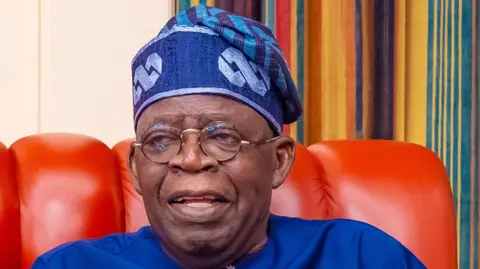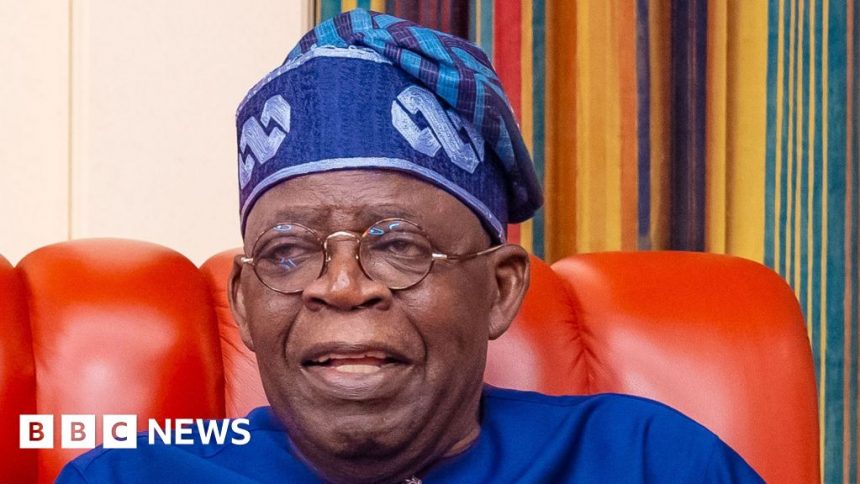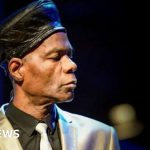Nigeria’s president warns youth not to join ‘sinister’ protests
 AFP
AFPNigeria’s President Bola Tinubu has urged young people not to join nationwide cost-of-living protests planned for next week, saying they are the work of “sinister” people “capitalising” on the country’s economic woes.
Organisers are said to have drawn inspiration from events in Kenya.
Protesters in the East African nation are now calling on President William Ruto to resign after winning key demands – including the scrapping of planned tax rises and the dismissal of almost the entire cabinet.
Nigeria’s last mass demonstration was three years ago, against a reviled police unit accused of extra-judicial killings.
The #EndSARS movement achieved its aim of disbanding the force but was met with a violent crackdown in which dozens of protesters were killed.
As demonstrations planned for 1 August in Nigeria draw nearer, President Tinubu has urged organisers to drop their plans.
“Capitalising on the economic hardship in the country, some men and women with sinister motives have been reported to have been mobilising citizens, particularly youths, to stage a protest,’’ he said.
The speech was delivered on the president’s behalf to a gathering of traditional leaders on Monday by the secretary to the government, George Akume.
Referring to India, which has been hit by religious clashes, and Sudan, which has been destroyed by a civil war, he added: “Let’s learn from India and Sudan’s experiences. We are a country with more than 200 million people. Therefore, we can’t afford to have this kind of situation.”
Trade union bosses are urging Mr Tinubu to sit down with the protest organisers, and not to dismiss their concerns as “sponsored political dissent”.
“A situation where most Nigerian families are forced to eat one miserable meal a day and eating from the dustbin beckons for serious intervention by the government,” said the Nigeria Labour Congress.
But Mr Tinubu’s camp has accused supporters of defeated presidential candidate Peter Obi of planning the protests, and galvanising support on social media with hashtags such as #TinubuMUSTGo and #EndBadGovernanceInNigeria.
“Obi should be held responsible for anarchy,” said presidential adviser Bayo Onanuga in an online post.
Mr Obi’s Labour Party has issued a statement denying this, calling the allegations a “figment of his imagination” and branding the government “puerile”.
“Labour Party, Peter Obi and our supporters are not planning any protests,” the statement continued, but pointedly added: “The people have the right to protest and it is within their constitutional right”.
Mr Obi rallied young people, mostly in southern Nigeria, in the 2023 election, but came third. He alleged that the result was rigged in Mr Tinubu’s favour, but a court dismissed his case.
Local media say there is also opposition to the planned protests from a group of small-scale retailers, called the Self Reliance for Physically Challenged Traders of Nigeria, who say they “do not want to experience the turmoil and violence that occurred during the #EndSARS protests, which left deep scars on our nation.”
Across the continent in Uganda, there are similar fears from President Yoweri Museveni who warned protesters against “playing with fire” and accused them of undermining his government while “we are busy producing wealth” for the country.
A number of demonstrators were arrested on Tuesday trying to make their way to parliament to protest against what they say are high levels of corruption in government.
On the same day in neighbouring Kenya, police tear-gassed hundreds of protesters in the capital city, Nairobi. Many were attempting to reach the main airport and shut down operations.
More BBC stories from Nigeria:
 Getty Images/BBC
Getty Images/BBCGo to BBCAfrica.com for more news from the African continent.
Follow us on Twitter @BBCAfrica, on Facebook at BBC Africa or on Instagram at bbcafrica







